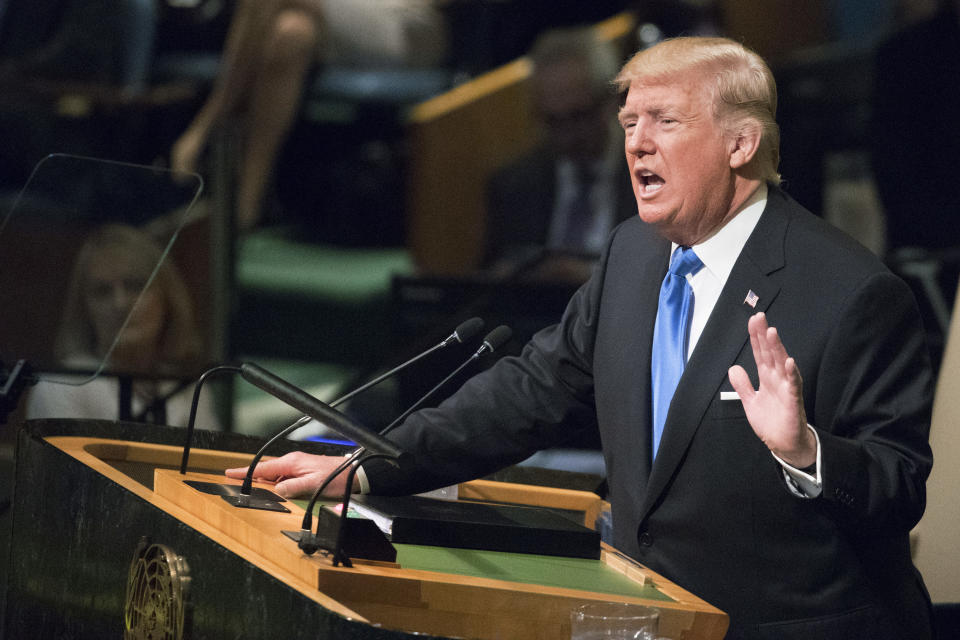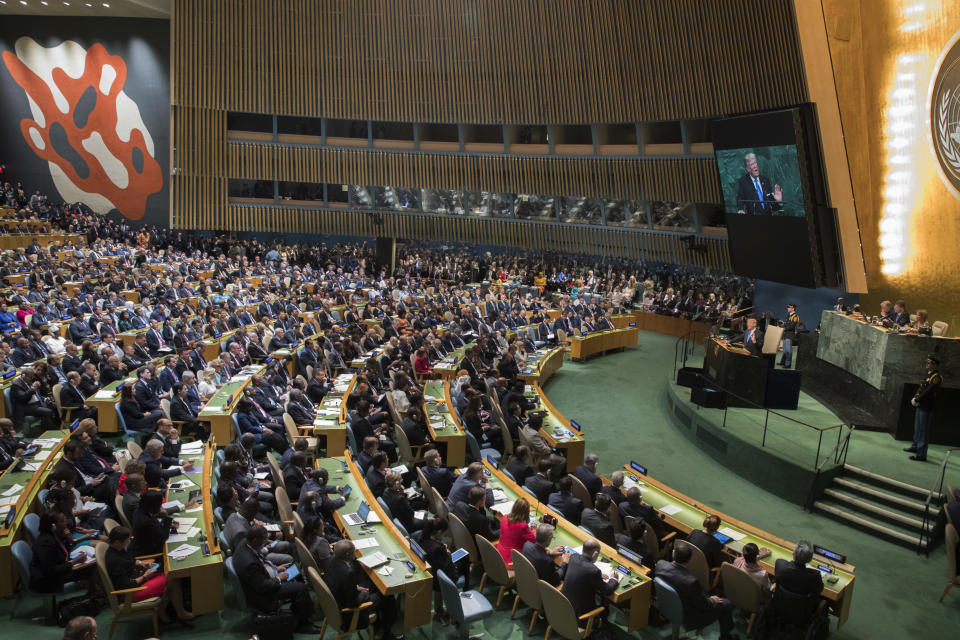Trump warns U.S. may have to 'totally destroy' North Korea
NEW YORK — President Trump bluntly warned in a speech to the United Nations on Tuesday that the United States may be forced to “totally destroy North Korea” if that country proceeds with its nuclear and intercontinental ballistic missile programs.
Condemning the “depraved” North Korean regime as a major threat to global security, Trump mocked its leader, Kim Jong Un, saying: “‘Rocket Man’ is on a suicide mission for himself and for his regime.”
“The United States has great strength and patience, but if it is forced to defend itself or its allies, we will have no choice but to totally destroy North Korea,” the president told world leaders in his first address to the annual U.N. General Assembly.
That unusually martial language from the U.N. rostrum drew a rebuke from Sen. Dianne Feinstein, a top Democrat on the Senate Intelligence Committee, who said that the president used the United Nations “as a stage to threaten war” and said his “bombastic threat” did nothing to help defuse the crisis.
Trump’s stark message came in a roughly 40-minute speech in which he also sharply criticized China, mildly rebuked Russia, condemned Venezuela’s government, and suggested he might scrap the Iran nuclear deal. Overall, the tone was a nod back to his 2016 campaign’s unapologetically nationalist approach to world affairs.

“I will always put America first, just like you, as the leaders of your countries, will always and should always put your countries first,” the president said. “In America, we do not seek to impose our way of life on anyone, but rather to let it shine as an example for everyone to watch.”
Some of Trump’s toughest language targeted China, North Korea’s primary patron and trading partner.
Slideshow: World leaders’ faces react to Trump’s U.N. speech >>>
“It is an outrage that some nations would not only trade with such a regime, but would arm, supply and financially support a country that imperils the world with nuclear conflict,” he said, without explicitly naming Beijing. “No nation on earth has an interest in seeing this band of criminals arm itself with nuclear weapons and missiles.”
Chinese President Xi Jinping skipped the General Assembly, as he frequently does. Other absent leaders included Russian President Vladimir Putin and German Chancellor Angela Merkel.
Trump also pressed for global action to rein in Tehran and hinted that he could either tear up the Iran nuclear deal, which he pronounced “one of the worst and most one-sided” accords Washington has ever signed, or declare that the Islamic Republic is not in compliance with the agreement.
“We cannot abide by an agreement if it provides cover for the eventual construction of a nuclear program,” he said. “Frankly, that deal is an embarrassment to the United States, and I don’t think you’ve heard the last of it, believe me.”

Russia rated only a couple of passing mentions in the speech: Trump lumped its invasion of Ukraine among “threats to sovereignty” that deserve condemnation, but praised Moscow for joining recent unanimous 15-0 U.N. Security Council votes to tighten sanctions on North Korea.
But Trump, who in mid-August had floated a “possible military option” to respond to Venezuela’s slide into chaos, railed at length against that country’s leader, Nicolas Maduro.
“The Venezuelan people are starving, and their country is collapsing. Their democratic institutions are being destroyed. This situation is completely unacceptable, and we cannot stand by and watch,” the president said. “We are prepared to take further action if the government of Venezuela persists on its path to impose authoritarian rule on the Venezuelan people.”
Trump further vowed to “stop radical Islamic terrorism,” a phrase he had left out of recent speeches, and declared, “It is time to expose and hold responsible those countries who support and finance terror groups.” He did not name names.

Again and again, the president returned to the theme of national sovereignty, describing international trade deals and immigration as threats to America’s identity.
“The United States will forever be a great friend to the world, and especially to its allies,” he promised. “But we can no longer be taken advantage of or enter into a one-sided deal where the United States gets nothing in return.”
And he blamed “mammoth multinational trade deals, unaccountable international tribunals and powerful global bureaucracies” for lost jobs and shuttered factories in the United States.
Returning to a core theme of his campaign, Trump said: “Our great middle class, once the bedrock of American prosperity, was forgotten and left behind. But they are forgotten no more, and they will never be forgotten again.”
Trump’s presidency has been shaped by a range of clashes with foreign allies. The president has suggested that he would not honor NATO’s mutual-defense provision unless partner nations stepped up defense spending. He scrapped U.S. participation in the Trans-Pacific Partnership, upsetting leaders in Japan, South Korea and a number of other countries worried about being in the shadow of a rising China. He called for ending the U.S. trade deal with South Korea, shocking Seoul at a time when both countries need to cooperate on North Korea. He withdrew from the Paris Agreement to fight climate change, a step French President Emmanuel Macron has urged him to reconsider. And Trump has repeatedly said Mexico will pay for the border wall he promised during his campaign, something America’s southern neighbor flatly rejects.
Trump made no mention of the Middle East peace process or international efforts to combat climate change in his remarks.
Read more from Yahoo News:


